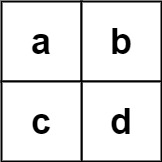Given an m x n board of characters and a list of strings words, return all words on the board.
Each word must be constructed from letters of sequentially adjacent cells, where adjacent cells are horizontally or vertically neighboring. The same letter cell may not be used more than once in a word.
Example 1:

Input: board = [["o","a","a","n"],["e","t","a","e"],["i","h","k","r"],["i","f","l","v"]], words = ["oath","pea","eat","rain"]
Output: ["eat","oath"]
Example 2:

Input: board = [["a","b"],["c","d"]], words = ["abcb"]
Output: []
Constraints:
m == board.length
n == board[i].length
1 <= m, n <= 12
board[i][j] is a lowercase English letter.1 <= words.length <= 3*10^4
1 <= words[i].length <= 10
words[i] consists of lowercase English letters.words are unique.題目給定一個 m by n 字元矩陣 board 還有一個字串 array words
要求實作一個演算法找出字串 array words 有哪些字串存在於 m by n 矩陣
在 m by n 矩陣搜詢一個字串做的法是從每個字元當作起點針對上下左右四個方向做 DFS 找尋有可能的字串,所以最遭的狀況就是 (4^m)^n
Trie 的結構能夠有效讓要搜尋的字串可以用一個很有效率的方式做比對
如下圖

package sol
type Node struct {
Children map[byte]*Node
isWord bool
word string
}
type Trie struct {
root *Node
}
func Constructor() Trie {
return Trie{
root: &Node{
Children: make(map[byte]*Node),
isWord: false,
},
}
}
func (this *Trie) AddWord(word string) {
cur := this.root
wLen := len(word)
for idx := 0; idx < wLen; idx++ {
ch := word[idx]
if _, exists := cur.Children[ch]; !exists {
cur.Children[ch] = &Node{
Children: make(map[byte]*Node),
isWord: false,
}
}
cur = cur.Children[ch]
}
cur.isWord = true
cur.word = word
}
type Pair struct {
row, col int
}
func findWords(board [][]byte, words []string) []string {
trie := Constructor()
for _, word := range words {
trie.AddWord(word)
}
visit := make(map[Pair]struct{})
res := make(map[string]struct{})
col, row := len(board), len(board[0])
var dfs func(r int, c int, node *Node)
dfs = func(r int, c int, node *Node) {
cur := node
if r < 0 || c < 0 || r >= row || c >= col {
return
}
if _, visited := visit[Pair{row: r, col: c}]; visited {
return
}
ch := board[r][c]
if _, match := cur.Children[ch]; !match {
return
}
visit[Pair{row: r, col: c}] = struct{}{}
cur = cur.Children[ch]
if cur.isWord {
res[cur.word] = struct{}{}
}
if len(res) == len(words) {
return
}
// 往上下左右找詢
dfs(r-1, c, cur)
dfs(r+1, c, cur)
dfs(r, c-1, cur)
dfs(r, c+1, cur)
delete(visit, Pair{row: r, col: c})
}
for r := 0; r < row; r++ {
for c := 0; c < col; c++ {
dfs(r, c, trie.root)
}
}
result := make([]string, len(res))
count := 0
for key := range res {
result[count] = key
count++
}
return result
}
